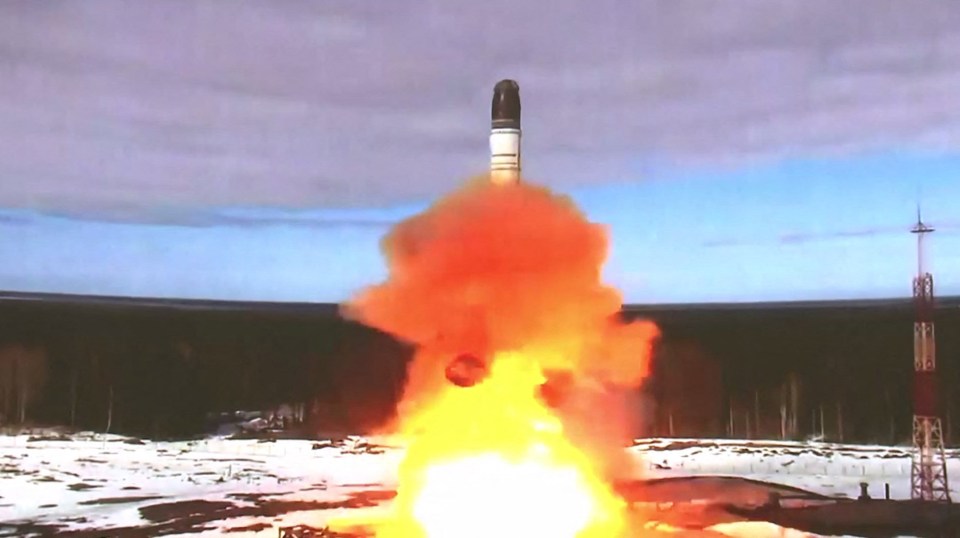A WORLD war could erupt if China and Russia give artificial intelligence control of nuclear weapons, a top US official has warned.
Beijing and Moscow have been urged to follow Washington, London and Paris in declaring only humans will be granted powers to deploy nukes.
AFPThe launching of the Sarmat intercontinental ballistic missile at Plesetsk testing field, Russia[/caption]
AlamyA LGM-30G Minuteman III intercontinental ballistic nuclear missile in the launch silo at Malmstrom Air Force Base[/caption]
Nations around the world are grappling to regulate AI amid fears of what handing any control to machines could do.
Experts from both the tech and academia circuits have cautioned of the dangers AI could pose – and that it could be an existential risk to humanity.
Leaders have also warned AI could be fast approaching its “Oppenheimer moment” and implored action to regulate it.
Now it is feared China and Russia could give control of nuclear weapons to AI and potentially spark a doomsday situation.
US State Department arms control official Paul Dean said Washington, France and the UK have made a “clear and strong commitment” that humans have total control over nukes.
He has implored Russia and China to follow suit.
Dean, principal deputy assistant secretary in the Bureau of Arms Control, Deterrence and Stability, said: “We would welcome a similar statement by China and the Russian Federation.
“We think it is an extremely important norm of responsible behaviour and we think it is something that would be very welcome in a P5 context,” he added, referring to the five permanent members of the United Nations Security Council.
Dean’s remarks come as the administration of US President Joe Biden tries to deepen separate discussions with China over both nuclear weapons policy and the growth of artificial intelligence.
The spread of artificial intelligence technology surfaced during sweeping talks between US Secretary of State Antony Blinken and China’s Foreign Minister Wang Yi in Beijing on April 26.
Both sides agreed to hold their first bilateral talks on artificial intelligence in the coming weeks, Blinken said.
He added that they would share views on how best to manage risks and safety surrounding the technology.
As part of normalising military communications, US and Chinese officials resumed nuclear weapons discussions in January, but formal arms control negotiations are not expected any time soon.
China, which is expanding its nuclear weapons capabilities, urged in February that the largest nuclear powers should first negotiate a no-first-use treaty between each other.
It comes amid a global push to coordinate the regulation of AI amid growing concern on the international stage of military use of it.
Russia has threatened to deploy nukes against Ukraine and its enemies, while China has expanded its arsenal in recent years.
At a conference in Vienna on Monday, officials from more than 100 countries met to discuss AI and its use in militarised systems.
Referencing one of the inventors of the atomic bomb, Austrian Foreign Minister Alexander Schallenberg said: “This is the Oppenheimer moment of our generation.
“Now is the time to agree on international rules and norms.
“At least let us make sure that the most profound and far-reaching decision — who lives and who dies — remains in the hands of humans and not of machines.”
The dangers of AI
AI is growing more widespread and sophisticated – but has a number of dangers.
The US State Department has warned that the accelerating speed at which AI is being developed could be “catastrophic” for humanity.
A report looking at the risks associated with AI says that the US government needs to move “quickly and decisively” to look into minimizing the power given to developing AI.
The report claims that we could face an “extinction-level threat to the human species” if no action is taken.
Dangers of AI include:
Existential risks – it is feared an artificial general intelligence (AGI) that surpasses human intelligence could be developed. Such advanced AI systems could prove catastrophic for humans, as its values may be in line with that of humans.
Misinformation and manipulation – AI could add to the spread of false information, which the use of AI-generated content such as deepfakes.
Weapons powered by AI – experts fear AI will be harnassed for warfare purposes, which could see autonomous weapons controlled by machines.
Lack of data privacy – AI chatbots and AI face filters , both commonly used by members of the public, collect personal data when being used. The data can’t be considered secure.
Job losses – the development of AI could lead to job losses, as many roles could become automated.

